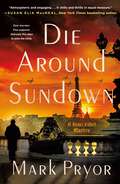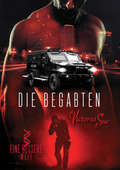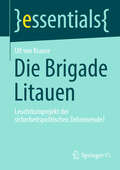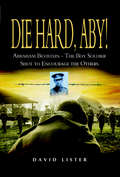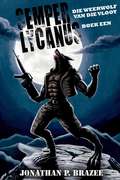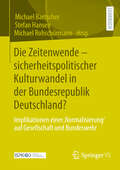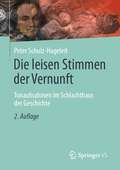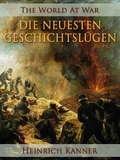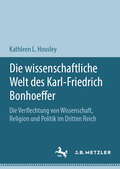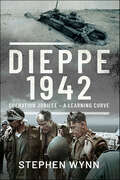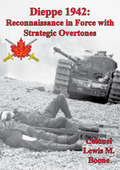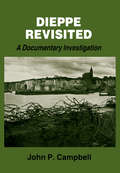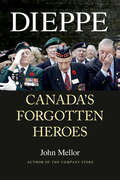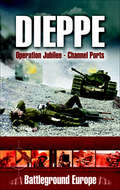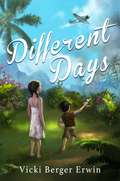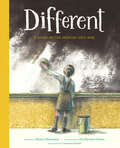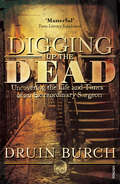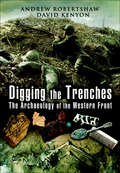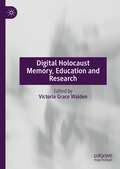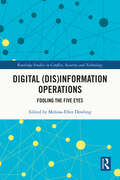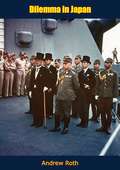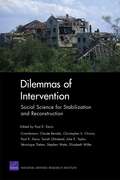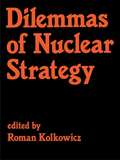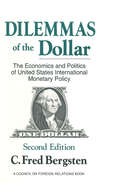- Table View
- List View
Die Around Sundown: A Henri Lefort Mystery (Henri Lefort Mysteries #1)
by Mark PryorMark Pryor's Die Around Sundown is the first entry in an exciting mystery series set in Paris during World War II, where a detective is forced to solve a murder while protecting his own secrets.Summer 1940: In German-occupied Paris, Inspector Henri Lefort has been given just five days to solve the murder of a German major that took place in the Louvre Museum. Blocked from the crime scene but given a list of suspects, Henri encounters a group of artists, including Pablo Picasso, who know more than they're willing to share. With the clock ticking, Henri must uncover a web of lies while overcoming impossible odds to save his own life and prove his loyalty to his country. Will he rise to the task or become another tragic story of a tragic time?Five days. One murder. A masterpiece of a mystery.
Die Begabten (Eine bessere Welt #1)
by Victoria SueEine bessere Welt: Buch EinsAls Talon Valdez zu einem Begabten wurde, wusste er, dass es mit seinem Leben und seinen Träumen vorbei war. Geschmäht, mit Misstrauen betrachtet und häufig eingesperrt wurden diese Menschen mit besonderen Fähigkeiten von der Öffentlichkeit verachtet und als Monster gesehen, denen man niemals so weit trauen konnte, dass sie für das Militär oder als Gesetzeshüter arbeiten durften. Dann bietet sich ihm Jahre später die Gelegenheit, eine Sondereinheit von Begabten aufzubauen, die das FBI unterstützen soll. Die Bedingung dafür ist jedoch, dass jedem Begabten ein normaler Mensch als Partner zugeteilt wird. Finn Mayer träumte seit seinem vierzehnten Lebensjahr von einer Karriere beim FBI und brachte jedes nur mögliche Opfer, um den Traum wahr zu machen, auch wenn er dafür seine selbstsüchtige Mutter und seinen homophoben, tyrannischen Bruder ertragen und auf einen Freund verzichten musste. Doch seine nicht diagnostizierte Dyslexie durchkreuzt diesen Plan. Seine letzte Chance ist die Zusammenarbeit mit Talon, einem Begabten mit einer tödlichen Fähigkeit, der normalen Menschen nicht traut und Finn scheitern sehen möchte. Ihm bleiben vier Wochen, um sich dem Team zu beweisen. Dem Team bleiben vier Wochen, um sich der Öffentlichkeit zu beweisen. Und als eine andere Gruppierung ihren Erfolg – und sie selbst – in Gefahr bringt, müssen sie vier Wochen lang um ihr Leben kämpfen.
Die Brigade Litauen: Leuchttumprojekt der sicherheitspolitischen Zeitenwende? (essentials)
by Ulf von KrauseDieses essential analysiert die geplante dauerhafte Stationierung einer Brigade der Bundeswehr in Litauen, die vom Verteidigungsministerium als "Leuchtturmprojekt der von Bundeskanzler Olaf Scholz ausgerufenen sicherheitspolitischen Zeitenwende" beschrieben wird. Es ordnet das Projekt in den Zusammenhang der Reaktionen der NATO auf den Angriffskrieg Russlands auf die Ukraine und die Bedrohung gegenüber NATO-Staaten ein und zeigt auf, dass dadurch die Abschreckung und die Rolle Deutschlands im Bündnis erheblich gestärkt werden können. Das essential resümiert, dass ein Scheitern des Projekts aufgrund von Risiken, die aus einem spontanen Entscheidungsgang folgen, erhebliche außen- und innenpolitische negative Folgen nach sich ziehen würde.
Die Hard, Aby!: Abraham Bevistein - The Boy Soldier Shot to Encourage the Others
by David ListerRecent books, many by Pen and Sword, such as Shot At Dawn have highlighted the shocking cases of young British soldiers in the Great War being executed by their own side. All too often their trials were cursory and the evidence flimsy. This scandal has appalled right-minded people of all political persuasions. This book examines in depth the case of a young Jewish boy, Aby Beverstein who enlisted in the Middlesex Regiment. Aby was wounded, hospitalized and on (possibly premature) release did not return to his battalion immediately. The authorities arrested and tried him.His execution was greeted with horror by his family and those who knew him and readers will feel equally outraged.
Die Weerwolf van die vloot
by Elaine Jonathan P. BrazeePrivaat Eerste klas Aiden Kaas het by die Mariene aangesluiot vir al die verkeerde redes. Na ontplooing na Irak op negentien, wou hy net sy toer klaar maak. Maar nadat hy deur 'n waarskynlike mal majuhideen gebyt is, ly hy aan 'n seldsame siekte , een met nagevolge wat hy nie in sy woldse drome sou kon voorspel nie. En die siekte het hom aan groter gevare bloodgestel as wat sy onplooing ooit kon. Aiden besef wat dit beteken om 'n man te word, en hoe hy tot verhaal moet kom met wat hy geword het. Waarskuwing: Boek bevat dele met geweld en seks.
Die Zeitenwende – sicherheitspolitischer Kulturwandel in der Bundesrepublik Deutschland?: Implikationen einer ,Normalisierung' auf Gesellschaft und Bundeswehr
by Stefan Hansen Michael Bartscher Michael RohschürmannNach dem russischen Angriffskrieg auf die Ukraine und der ausgerufenen Zeitenwende erkennt die deutsche Gesellschaft mehrheitlich die Notwendigkeit eines bedrohungsgerechten Fähigkeitsaufwuches der deutschen Streitkräfte an. Die Friedensdividende ist aufgebraucht, der Pazifismus offenbar gescheitert, die Zivilmachtrolle überholt - findet in Deutschland somit ein sicherheitspolitischer Kulturwandel statt? Der vorliegende Band vereint Entscheidungsträger sowie Expertinnen und Experten aus unterschiedlichen Fachrichtungen, um zunächst die dramatisch veränderte sicherheitspolitische Lage aufzuzeigen und sodann die Beziehung der deutschen Gesellschaft zu ihren Streitkräften, die Veteranenkultur und -politik im Vergleich zu anderen Nationen sowie die Auswirkungen der Zeitenwende auf die Bundeswehr als Ganzes, aber auch auf den einzelnen Soldaten zu untersuchen.
Die leisen Stimmen der Vernunft: Tonaufnahmen im Schlachthaus der Geschichte
by Peter Schulz-HageleitGeschichte als Abfolge von Massentötungen aller Art und – im Gegensatz dazu – Geschichte als Konzert von leisen Stimmen, die den Frieden beschwören und Vernunft anmahnen: das sind zwei Leitmotive des Buches, die in verschiedenen Inhaltsvariationen thematisiert werden. Dabei finden die grauenhaften Tatsachen der Geschichte ebenso Berücksichtigung wie die kognitiv-emotionale Schwierigkeit, im historisch-politischen Schlachthaus-Geschehen (Kriege, Völkermorde) nicht die Augen zu verschließen, sondern vielmehr standzuhalten und existenziell für eine bessere Welt einzutreten.Was zur Zeit der ersten Auflage des Buches (2006) weit entfernt von realgeschichtlichen Möglichkeiten zu liegen schien, ein imperialistischer Eroberungskrieg, ist seit Februar 2022 bedrückende Wirklichkeit. Die veränderte weltpolitische Konstellation entwertet die früheren Reflexionen und Recherchen nicht, sondern taucht die Befunde in ein noch grelleres Licht.Das Buch wendet sich nicht nur an Personen, die Geschichte professionell erarbeiten und vermitteln, sondern an alle, die im Verhältnis zur Geschichte, wie es medienwirksam präsentiert und zelebriert wird, Probleme sehen.
Die neuesten Geschichtslügen (The World At War)
by Heinrich KannerHeinrich Kanner (* 9. November 1864 in Galați; † 15. Februar 1930 in Wien) war ein österreichischer Politiker, Journalist und Zeitungsherausgeber. Noch während des Weltkrieges begann Heinrich Kanner seine Recherche nach der Kriegsschuldfrage. Zu diesem Zwecke interviewte er während des Krieges eine Reihe von prominenten Vertretern des öffentlichen Lebens darunter auch mehrfach Leon von Bilinski, der von 1912 bis 1915 gemeinsamer Finanzminister der Donaumonarchie war und an den entscheidenden Sitzungen und Besprechungen über die Außenpolitik in dieser Zeit teilgenommen hat. Bilinski bezeugte in den Gesprächen mit Kanner, dass Kaiser Franz Joseph seit dem Frühjahr 1913 fest entschlossen war, nötigenfalls eine Aktion am Balkan zu genehmigen und zwar unbeschadet des Risikos eines Zusammenstoßes mit Russland. (Auszug aus Wikipedia)
Die wissenschaftliche Welt des Karl-Friedrich Bonhoeffer: Die Verflechtung von Wissenschaft, Religion und Politik im Dritten Reich
by Kathleen L. HousleyIm Deutschland des 20. Jahrhunderts wurde Karl-Friedrich Bonhoeffer als brillanter Chemiker bekannt, während mehrere seiner Verwandten – darunter Dietrich Bonhoeffer – in den Widerstand gegen Hitler verwickelt waren, was zu ihrer Hinrichtung führte. Dieses Buch zeichnet die Verflechtung von Wissenschaft, Religion und Politik im Dritten Reich und im Leben von Karl-Friedrich, seiner Familie und seinen Kollegen, darunter Fritz Haber und Werner Heisenberg, nach. Der für den Nobelpreis nominierte Karl-Friedrich war ein Experte für schweres Wasser, ein Bestandteil der Atombombe. Während des Krieges geriet er zwischen die Fronten vonVerwandten, die Hitler töten wollten, und Freunden, die Hitler beim Bau einer Atomwaffe halfen. Karl-Friedrich entpuppt sich als eine komplexe Figur – ein Agnostiker, dessen Bruder ein renommierter Theologe war, und ein Chemiker, der sowohl widerwillig deutsche Atomwissenschaftler beriet als auch mit Paul Rosbaud, einem Spion der Briten, zusammenarbeitete. Die wissenschaftliche Welt von Karl-Friedrich Bonhoeffer ist die Geschichte eines Mannes, der die Chemie, seine Familie und seine Nation liebt und versucht, inmitten des Chaos allen gerecht zu werden.
Dieppe 1942: Operation Jubilee—A Learning Curve
by Stephen WynnOn 19 August 1942, an Allied amphibious raid took place on the coastal town of Dieppe in northern France, when a force of some 6,500 infantry soldiers, predominantly Canadian, and supported by a number of tanks were landed by ships of the Royal Navy under a blanket of cover provided by the RAF. The official reason for the raid was to capture the town's port, gather relevant intelligence, and destroy a number of coastal defenses, port structures and other identified buildings. Allied authorities believed the raid would not only provide a much-needed boost to Allied morale, but also demonstrate to Stalin that Britain and the United States were serious in their commitment to opening a second front, in order to help the Soviet army fighting on the Eastern Front. It has also been suggested that the real reason for the raid was to capture a new German 4-rotor Enigma code machine, along with related code books. Whatever the reasons for the raid, it was an unmitigated failure. The German defenses were more formidable than intelligence reports suggested they would be, Allied aerial and naval support was insufficient, meaning soldiers were unable to achieve their objectives, and most of the tanks failed to make it off the beaches. Indeed, due to the unexpected mounting casualties, the decision was taken to cut short the raid and evacuate the remaining men.
Dieppe 1942: Reconnaissance In Force With Strategic Overtones
by Colonel Lewis M. BooneIn the early hours of August 19, 1942 an amphibious force of approximately 6000 troops, primarily Canadians of the 2nd Infantry Division, approached the coast of France. Their destination was the small port of Dieppe and their mission was to foster German fear of an attack in the West and compel them to strengthen their Channel defenses at the expense of other operational areas. Their secondary purpose was to learn as much as possible about new techniques and equipment and gain experience and knowledge necessary for a future great amphibious assault. By early afternoon, 807 Canadians lay dead in and around Dieppe. Another 100 would die of wounds, and in captivity, and about 1900 more would sit out the rest of the war in POW camps. The intent of this paper is not to refight the battle in detail, but to examine the strategic implications of the raid in terms of future operations by the Allies. This paper will also inform the reader on the utility of the mission given the tragic loss of life that day. Historians still debate whether Dieppe was a "needless slaughter" or a precursor for success at Normandy on 6 June 1944.
Dieppe Revisited: A Documentary Investigation (Studies in Intelligence)
by John P. CampbellThis book reappraises the ill-fated raid named operation Jubilee, focusing on aspects such as naval and air operations in the Channel, signals, radar intelligence, agents and deception. It draws from official archives, both German and Allied. From these voluminous but fragmented records, many of which have been destroyed, classified or lost, the book aims to thread the evidence together.
Dieppe: Canada's Forgotten Heroes
by John MellorThis WWII historical memoir chronicles the Canadian-led raid on a Nazi-occupied port in Northern France, as well as capture and escape from POW camps. Gripping in its intensity and detail, John Mellor&’s account of the doomed raid on Dieppe, France, in 1942 combines authoritative research with his own firsthand experience. Examining the debate surrounding this tactical failure, Mellor also puts the reader in the landing craft and on the beaches with individual Canadian soldiers. Dieppe recounts the terrible deaths of 807 Canadians and the damage to 1,946 survivors whose subsequent march to German prisoner-of-war camps is nearly as tragic as the raid itself. Mellor writes candidly about the survival tactics, the successful tunnel escapes, and the heroism of nearly three years in appalling captivity, including the desperate &“death marches&” the prisoners endured.
Dieppe: Operation Jubilee—Channel Ports (Battleground Europe)
by Tim SaundersA comprehensive history of the Allied attack on German-occupied France during World War II, examining its planning, execution, and failure. In 1942, with the outcome of the war very much in the balance, there was a pressing need for military success on mainland Europe. Churchill ordered Admiral Lord Mountbatten&’s Combined Operations HQ to take the war to the Germans. The Canadians were selected for the Dieppe raid, which, while a morale raiser, was a disaster. Over 3,000 men were lost. This authoritative account looks at the planning, execution and analyses the reasons for failure.
Dietrich Bonhoeffer's Letters and Papers from Prison A Biography
by Martin E. MartyFor fascination, influence, inspiration, and controversy, Dietrich Bonhoeffer's Letters and Papers from Prison is unmatched by any other book of Christian reflection written in the twentieth century. A Lutheran pastor and theologian, Bonhoeffer spent two years in Nazi prisons before being executed at age thirty-nine, just a month before the German surrender, for his role in the plot to kill Hitler. The posthumous Letters and Papers from Prison has had a tremendous impact on both Christian and secular thought since it was first published in 1951, and has helped establish Bonhoeffer's reputation as one of the most important Protestant thinkers of the twentieth century. In this, the first history of the book's remarkable global career, National Book Award-winning author Martin Marty tells how and why Letters and Papers from Prison has been read and used in such dramatically different ways, from the cold war to today. In his late letters, Bonhoeffer raised tantalizing questions about the role of Christianity and the church in an increasingly secular world. Marty tells the story of how, in the 1960s and the following decades, these provocative ideas stirred a wide range of thinkers and activists, including civil rights and antiapartheid campaigners, "death-of-God" theologians, and East German Marxists. In the process of tracing the eventful and contested history of Bonhoeffer's book, Marty provides a compelling new perspective on religious and secular life in the postwar era.
Different Days
by Vicki Berger ErwinTwelve-year-old Rosie is fiercely proud to be an American, and has a happy life with her family in their comfortable home in sunny Honolulu, Hawaii.Then, on the morning of December 7, 1941, Pearl Harbor is bombed and everything changes.Rosie's parents, both of German descent -- but American citizens who have lived in Hawaii nearly all their lives -- are immediately rounded up by the military. Though they've done nothing wrong, they are interrogated as German spies and imprisoned, and all the family's possessions are seized. Within days, Rosie and her brother are abandoned and homeless. A relative begrudgingly takes them in until their beloved aunt (who was also rounded up, but released) comes for them. Even then, the children's once-idyllic lives are filled with darkness and discrimination as they can only wait -- and hope -- for their parents' safe return.Based on true events, Different Days tells the story of a little-known aspect of World War II: the Internment of German Americans.
Different: A Story of the Spanish Civil War
by Mónica MontañésA resonant, captivating book about a brother and sister caught in a dark chapter of world history.Between 1936 and 1939, a civil war raged across Spain. For almost three years, ordinary citizens lived in fear of bombs dropping from the sky. When fascist dictator Francisco Franco declared victory, he began to persecute everyone who had once opposed him. Spain became a country of secrets, where anyone who was different was in danger.Different explores this turbulent period through the voices of seven-year-old Socorro and nine-year-old Paco. Because Papa has fled Spain due to his political beliefs, the siblings and their mother must hide the truth in order to survive. Paco is always hungry, and Socorro is never good enough for her teachers at school. But they can&’t ask for more food or better treatment: someone might find out who they are, or—worse—why their father isn&’t home anymore. At last a letter from Father arrives, with a chance for their family to reunite in Venezuela …Dramatic oil-pastel illustrations and poignantly chosen words express the emotions of two children coming of age in a time of extremism and fear. Based on the author&’s family history, this middle grade story is a stirring depiction of the Spanish Civil War, its tragic aftermath, and the timeless struggle for freedom from political violence.
Digging Up the Dead: Uncovering the Life and Times of an Extraordinary Surgeon
by Druin BurchA tearaway young man from Norfolk, Astley Cooper (1768-1841) became the world's richest and most famous surgeon. Admired from afar by the Brontës and up close by his student Keats, his success was born of an appetite for bloody revolutions. He set up an international network of bodysnatchers, won the Royal Society's highest prize and boasted to Parliament that there was no one whose body he could not steal. Experimenting on his neighbours' corpses and the living bodies of their stolen pets, his discoveries were as great as his infamy. Caught up in the French Revolution, and in attempts to bring radical democracy to Britain, Cooper nevertheless rose to become surgeon to royals from the Prince Regent to Queen Victoria. Setting the past against his own reactions to autopsies and operations, hospitals and poetry, Burch's Digging Up the Dead is a riveting account of a world of gothic horror as well as fertile idealism.
Digging the Trenches: The Archaeology of the Western Front
by Andrew Robertshaw David KenyonThis comprehensive, illustrated survey of the latest in battlefield archaeology reveals &“intimate insight into the realities of life&” during WWI (Current Archaeology).Modern methods of archaeological, historical, and forensic research have transformed our understanding of the Great War. In Digging the Trenches, battlefield archaeologists Andrew Robertshaw and David Kenyon introduce the reader to this exciting new field and explore many of the remarkable projects that have been undertaken.Robertshaw and Kenyon show how archaeology can be used to reveal the positions of trenches, dugouts and other battlefield features, as well as what life on the Western Front was really like. They also show how individual soldiers are coming into focus as forensic investigation is so highly developed that individuals can be identified and their fates discovered.&“An excellent introduction to the subject…Digging the Trenches is essential reading.&”—Gary Sheffield, Military Illustrated&“What a splendid book this is.&”—Neil Faulkner, Current Archaeology
Digital Holocaust Memory, Education and Research
by Victoria Grace WaldenThis book explores the diverse range of practical and theoretical challenges and possibilities that digital technologies and platforms pose for Holocaust memory, education and research. From social media to virtual reality, 360-degree imaging to machine learning, there can be no doubt that digital media penetrate practice in these fields. As the Holocaust moves beyond living memory towards solely mediated memory, it is imperative that we pay critical attention to the way digital technologies are shaping public memory and education and research. Bringing together the voices of heritage and educational professionals, and academics from the arts and humanities and the social sciences, this interdisciplinary collection explores the practicalities of creating digital Holocaust projects, the educational value of such initiatives, and considers the extent to which digital technologies change the way we remember, learn about and research the Holocaust, thinking through issues such as ethics, embodiment, agency, community, and immersion. At its core, this volume interrogates the extent to which digital interventions in these fields mark an epochal shift in Holocaust memory, education and research, or whether they continue to be shaped by long-standing debates and guidelines developed in the broadcast era.
Digital: Fooling the Five Eyes (Routledge Studies in Conflict, Security and Technology)
by Melissa-Ellen DowlingThis book offers an interdisciplinary insight into the key debates around information warfare in the digital age and argues that transnational cooperation can mitigate the threat.States and societies are increasingly vulnerable to cyber-enabled information operations. From efforts to divide nations, undermine public policy, manipulate elections, and generate social discord, malign actors use the online realm to wreak havoc on our offline lives. The book explores the digital disinformation dilemma that confronts liberal democracies, reflecting on shared socio-political challenges and solutions to contemporary information operations amongst the Five Eyes states and beyond. The work aims to generate a holistic human-centric perspective on the challenges of digital (dis)information operations through interdisciplinary insight into shared challenges and solutions to contemporary information warfare. Together, these perspectives enable us to more effectively identify opportunities to address the challenge and increase the potential to enrich international collaborative efforts to safeguard liberal democracies from threats to their information environments.This book will be of much interest to students of information warfare, intelligence studies, foreign policy and International Relations.
Dilemma in Japan
by Andrew RothThe author of this book believes that certain Americans and Englishmen favor a peace formula for Japan which will provide only for a temporary truce. Just as German militarists and their industrial supporters were left in power after the First World War, in the same manner these men would leave the Japanese Emperor and his imperialist partners off control of Japan after this war. Believing that most Americans want permanent peace in spite of the cost, Mr. Roth provides a forceful analysis of the alternatives which face us—and the Japanese people.He shows first what we can expect from a defeated Japan if we follow this expedient but short-sighted policy of leaving the government in the hands of the so-called “moderates.” He points out that such a procedure would rule out the reconstruction of Japan on a democratic basis, for it would maintain in power the leading industrial giants, the Zaibatsu, of whom the greatest is the Emperor. These, combined with the semi-feudal landlords, of whom Hirohito is also the leader, have always followed a policy of economic imperialism, whether by means of military conquest or by the subtler methods of the “moderates.”This book is an honest warning by a keen analyst of Far Eastern affairs. We must realize before it is too late that we are headed toward disaster if we court the status quo in Japan. Here it is clearly demonstrated that a policy of appeasing the “moderates” can only end at another Pearl Harbor.
Dilemmas of Intervention
by Paul K. DavisGovernments intervening in post-conflict states find themselves beset with numerous challenges and profound dilemmas: It is often unclear how best to proceed because measures that may improve conditions in one respect may undermine them in another. This volume reviews and integrates the scholarly social-science literature relevant to stabilization and reconstruction, with the goal of informing strategic planning at the whole-of-government level.
Dilemmas of Nuclear Strategy
by Roman KolkowiczThis volume reflects the research and discussions for the Bellagio Conference, with a spcial emphasis on the distinct perspective introduced by the Europeans on the issues of superpower strategic relations in general and on MAD and SDI in particular. Their views are shaped by concerns on how these broader issues might affect their own national security interests.
Dilemmas of the Dollar: Economics and Politics of United States International Monetary Policy
by C. Fred BergstenAn examination of the role of the dollar in the global financial system which presents a long-term historical perspective on the international monetary system in this century. The main focus is on the evaluation of the global financial system in the post-war period.
